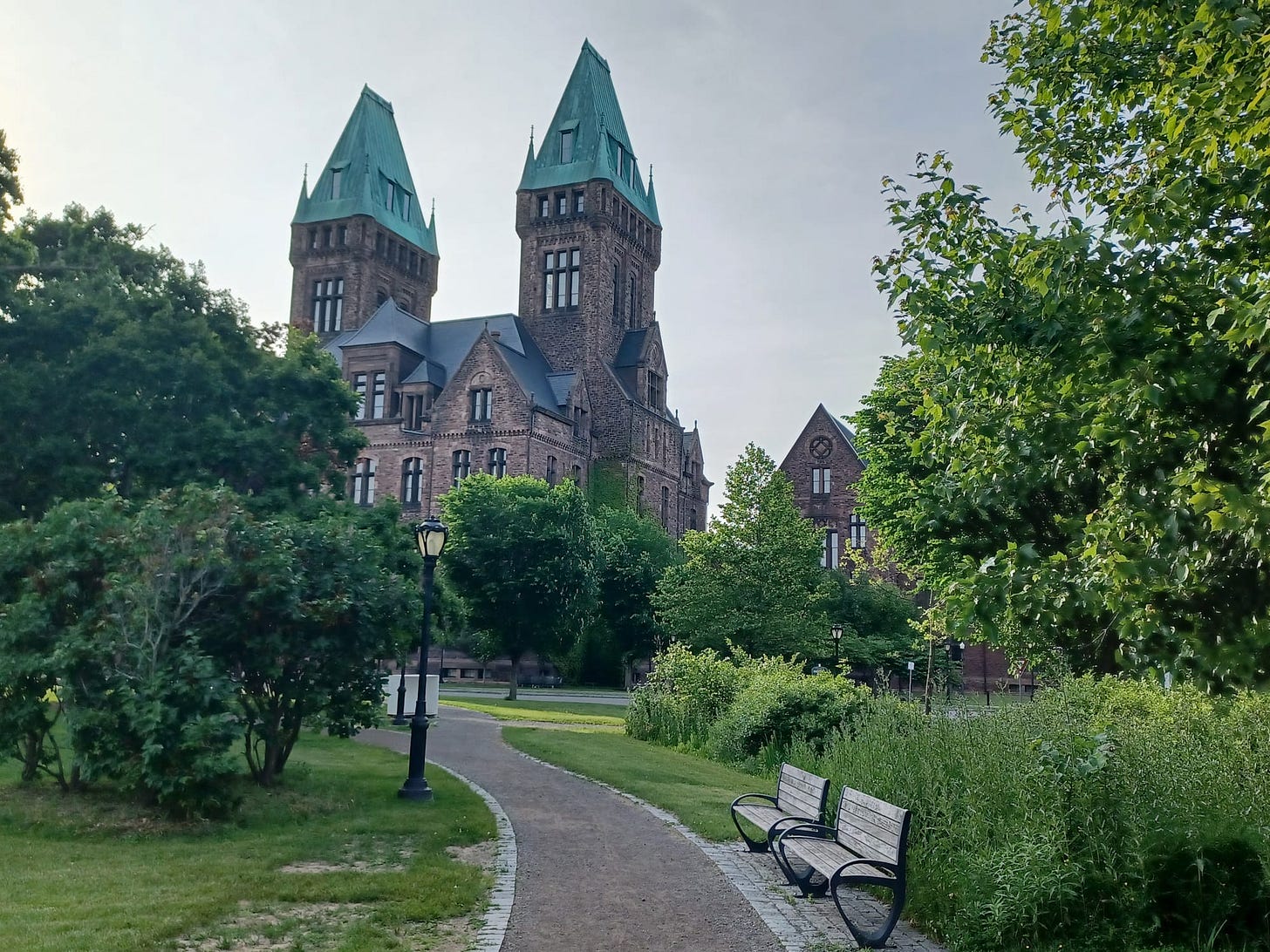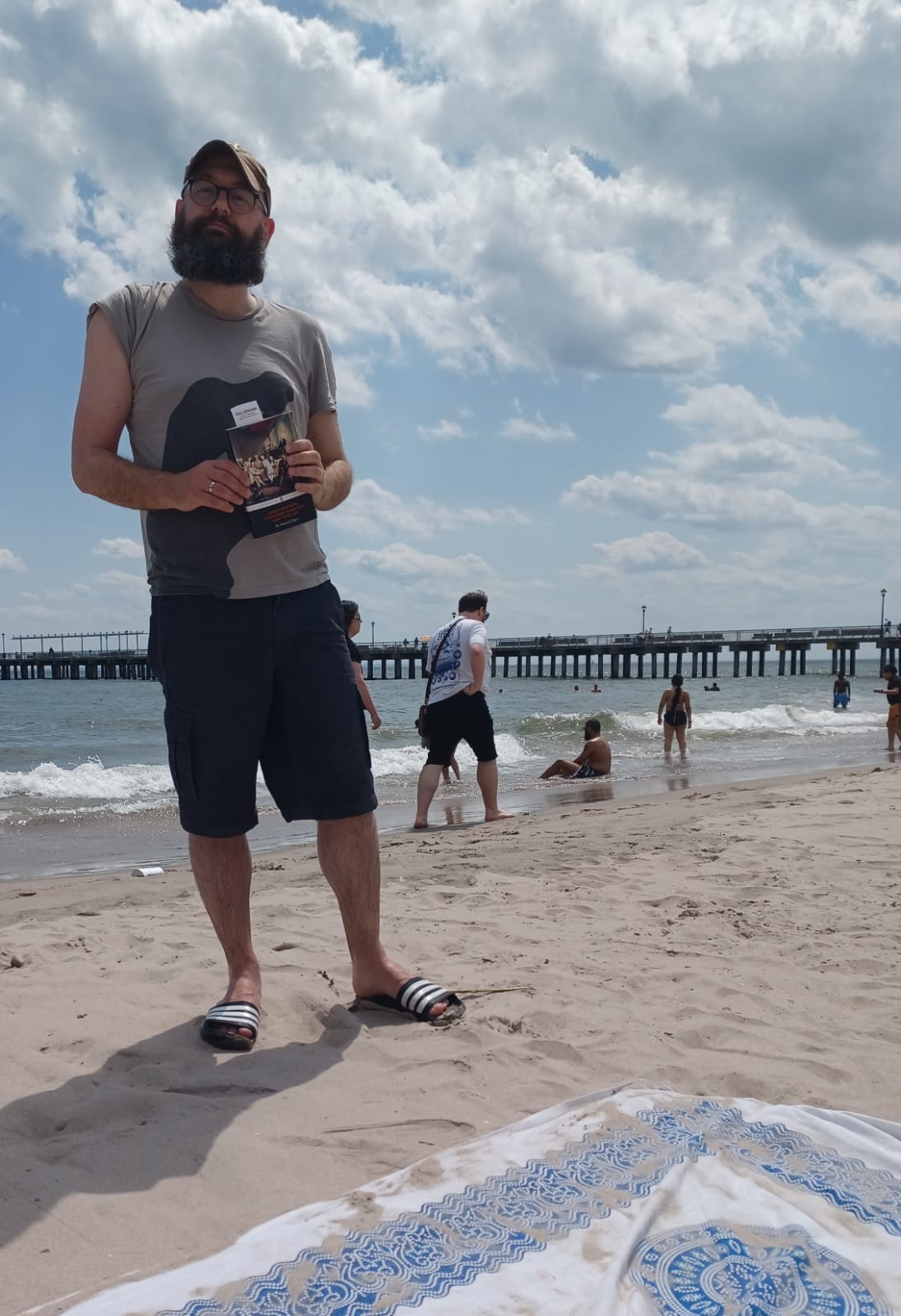On the Dialectic Between Dynamism and Stability
Reflections on the PPE at the Frontier workshop (Buffalo, NY)
Very short summary: This essay reflects on a PPE (philosophy, politics, and economics) workshop I’ve participated in Buffalo recently. I discuss the absence of a genuine PPE community in France and provide some thoughts about the topic of the workshop on institutional diversity and social dynamism. Regarding the latter, I insist on the idea that stability and dynamism are intrinsically related (with some photos of my stay in Buffalo and New York City as a bonus)
I had the pleasure to participate in the second annual PPE at the Frontier workshop, held at the Richardson Hotel in Buffalo (NY), June 17-18. The workshop gathered a crowd of distinguished PPE (for “philosophy, politics, and economics”) scholars, mostly philosophers and political scientists, as well as an economist (me!). Before indulging in some reflections on the field of PPE and the conference theme, I would like to publicly thank the organizers, especially Ryan Muldoon, the director of the PPE program at the University at Buffalo, for the kind invitation. It was arguably one of the most engaging scientific events I have attended, with high-quality talks and a very coherent program. A few words also on the location: as you can judge if you click on the link above, the Richardson Hotel is an iconic place. It is a former psychiatric hospital and –according to a security guard of the Buffalo AKG Art Museum who saw my Batman t-shirt—it apparently inspired the design of the Arkham asylum in the Batman comics! If you go to Buffalo, this is definitely the place to stay.
What strikes me the most as a French scholar is how much PPE is institutionalized as a field in U.S. universities. Many universities have PPE programs, and there is a lively and interdisciplinary scientific community. In particular, the PPE Society organizes every year a large conference in New Orleans and is even starting to export its events in Europe, with a conference in London next month. Now, PPE is not an American specialty. It actually has, if I’m not mistaken, British origins, and dozens of PPE programs now exist across Europe, from the Nordic countries to Italy, passing by Germany, the Netherlands, and Central Europe. One country only figures as an exception: France! There is simply no PPE program, neither at the bachelor's nor at the master's level in France, with the notable exception of a PPE Master at Sciences Po Lille. And when you look at the program of the PPE conference in London next month, French institutions are almost not represented at all.
That doesn’t mean that French scholars don’t do anything that corresponds to what is called PPE in Europe and North America, of course. I have several (but, ultimately, not so many) colleagues in France who do research at the intersection of economics and philosophy, and eventually political science. But very few explicitly identify themselves as “PPE scholars” and work within the PPE community. There are, I think, two complementary explanations of this state of affairs. First, the French higher education system is peculiar for its division between public universities and various public “schools” with a different administrative status. Among these public schools figure the IEP (Institut d’Etudes Politiques –Institute for Political Studies), the main one being Sciences Po Paris. The IEP are the higher education institutions that are the closest to offering something like a PPE program in France. When you look at the curricula, however, what they really provide is a training in political sciences with a significant economic component, though the courses tend to be less advanced and far less mathematical than what is taught in economics at universities. As for philosophy, it only has a minor place. The bottom line is that while there is no real equivalent to a genuine PPE program in France, the closest academic space is nonetheless occupied by IEP, not by universities.
Arriving at the Richardson Hotel!
This is also due to the peculiar organization of French universities, where economics, philosophy, and political sciences each belong to a different “faculté.” Economists, political scientists, and especially philosophers only rarely interact because of this institutional segregation. Building a PPE program in such an institutional context is very difficult because you first have to solve delicate administrative coordination problems before even starting to think of the pedagogical content of the program. Things are not better for academic research. Scientific research in French universities is still organized around the anachronistic disciplinary divisions of the CNU (Conseil National des Universités) that forces scholars to put themselves in a box (the very idea of a “professor of economics and political sciences” or of “philosophy and economics” is stranger to French universities) and to follow academic norms specific to the discipline. Add to this the fact that for various historical and intellectual reasons, French philosophers tend to have a low opinion of economists and economics (and reciprocally), and you have all the ingredients for what I would call a “French PPE impossibility result.” This is a sad state of affairs, but unfortunately, I don’t see any perspective for an improvement over the short term.
The Niagara Falls
Let me now make some observations related to the PPE at the Frontier workshop. The theme of the workshop was “Institutional Diversity and Social Dynamism.” It invited the participants to reflect on the dialectic between dynamic and stability. This was reflected in most if not all the talks, either from an abstract or a more applied perspective. Just to mention a few,[1] Piers Turner’s talk on “dynamic stability” in J.S. Mill’s political philosophy showed how Mill’s conception of democracy is centered around the delicate balance between the necessity to maintain a shared framework of rules of practices while encouraging innovative thoughts. Alex Oprea and Daniel Stephens argued that in an open society, immigration can contribute to reducing rather than fostering polarization, thus contributing to social stability. In an Ostromian spirit, Jim Johnson insisted on the multitude of institutional arrangements between markets and the state, which can eventually help to strike the right balance between dynamism and stability. Jim’s talk echoed one of the main points of the paper on the constitutional political economy of polycentric orders that I’ve presented. Polycentric orders are tailor-made for exploration, innovation, and discovery. On the other hand, their stability depends on a set of rules, especially aimed at mitigating externalities between autonomous political units. Stability is not given and, interestingly, goes hand in hand with dynamism. Social exploration and innovation are likely to give rise to unforeseen external effects, and appropriately dealing with them requires institutional dynamism so that the set of rules can accordingly evolve.
A cruise on the Erie Lake
Ryan Muldoon’s talk made a similar point from a slightly different perspective. Ryan argued that from a liberal perspective, we should not want society to be at the production possibility frontier (PPF). At first sight, this is a counterintuitive claim. A society at the PPF is efficient in the sense that it’s not wasting resources; any increase in the quantity produced of one good implies decreasing the quantity produced of some other good by some amount.[2] If we aren’t at the PPF, that presumably indicates that something is going wrong. That means that society is misallocating resources and that everybody’s well-being is lower than it could be. This is a purely static reasoning, however. Ryan’s point is that once we are the PPF, all discussions focus on how to distribute the resources available. This turns the social, economic, and political game into a zero-sum game –actually even a negative one, once we consider that parties will invest resources just to increase their share of the pie. The conflictual situation that results provides the fertile soil for the kind of illiberal and populist politics that are spreading nowadays.
The corollary of this view is, of course, not that we should waste resources, but rather that we should organize society so that the PPF is constantly pushed further away, putting us in a situation where mutually advantageous social interactions are constantly opened. As I suggested to Ryan during the Q&A, there seems to be a close relationship with the progressive left “abundance agenda” recently exposed by Ezra Klein and Derek Thompson.[3] The emphasis on distributive issues unavoidably leads to a conflictual conception of society, with social groups entering into competition for resources. The best way to avoid this political dead end is to demonstrate the possibility of creating and producing more while staying within the environmental limits of the planet. Bottom line: from a liberal perspective, the preservation of social stability depends on a high degree of economic and political dynamism that allows us to continuously expand our wealth-producing capacities.
At Rizzoli in NYC
As I’ve been thinking about this since the workshop, I can’t help but make a connection with what I was writing a few months back about the economic and political situation in France. I was then pointing out France’s misguided conservatism, occurrences of which pervade many domains of the French social life, from the economy to public universities. I see my country, large chunks of its population, but even more importantly, virtually all its political elites, still looking back at a fantasized past. A past where French was an international language, and France an economically and culturally influential empire as well as a major geopolitical player. Most French people realize that they probably pay too much tax (and so want to pay less), but on the other hand, desperately stick to their “social model” without understanding (or accepting) the unavoidable tradeoffs that this involves. The French society reflects what happens when you’re at the PPF and have forgotten to think about how to expand it, a society that is fixated on distributive conflicts with a singular lack of economic ambitions and political imagination. The last avatar of this is the debate around the so-called “Zucman tax.” Even if we may agree that there is something wrong with the fact that the overall tax rate tends to decrease for extremely high levels of wealth, the tax itself and the attention it attracts only reflect the above diagnosis. In a country where tax rates are already extremely high by international standards, there seems to be barely any other idea than to add an additional tax that will apply to a few thousand households. In the meantime, politicians from left to right are seriously considering going backward on the last reform of the pension system, while the demography leaves no doubt that people will have to work longer.
Reading the Federalist Papers on the beach at Coney Island!
Admittedly, there is a coherence behind all this, and it is precisely captured by the idea that we are stuck at the PPF; any further gains for some groups of the population must necessarily come by taking from other groups. In a politically paralyzed country where the current government is barely able to act due to a lack of majority in parliament, a change of mindset is more than ever called for. Maybe that’s an indication that we need a genuine PPE community in France, one that could more rigorously elaborate on this diagnosis and eventual remedies!
[1] My apologies to the colleagues I don’t mention here, this is not meant as a value judgment about the various talk!
[2] That doesn’t mean however that society is necessarily indifferent between two points located on the PPF. It depends on the society’s social welfare function (if we accept this concept as having any meaning at all). Being on the PPF is still, arguably, a necessary condition for efficiency.
[3] Ezra Klein and Derek Thompson, Abundance (New York Amsterdam Antwerpen: Avid Reader Press / Simon & Schuster, 2025).










That's terribly interesting, thank you for sharing. PPE didn't exist when I was in school, but my interests are very much along those lines and I hope to find workshops/events like this. Cheers. My sub: https://posocap.com